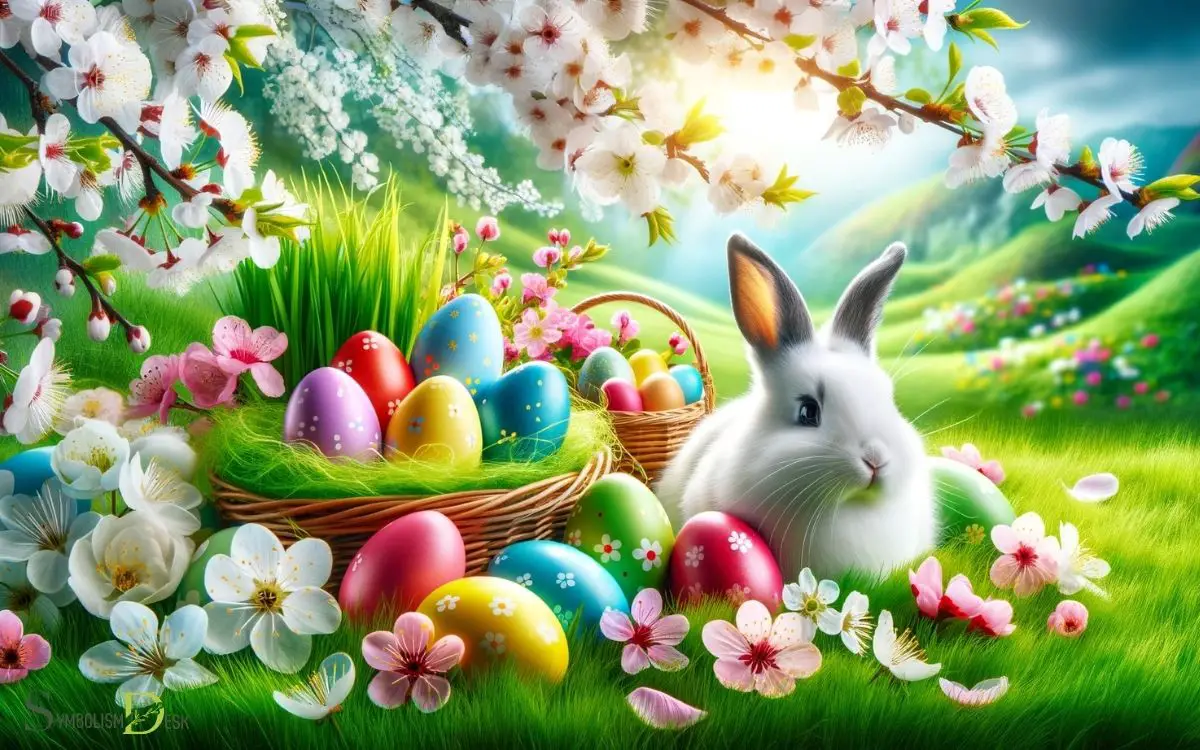What Is the Symbolic Meaning of Easter? Hope!
Easter symbolizes the resurrection of Jesus Christ and represents themes of renewal, hope, and redemption. It is a key event in Christianity marking Jesus’ victory over death, providing the foundation for the Christian faith.
The symbolic meaning of Easter is deeply rooted in Christian beliefs and includes:
- Resurrection: Central to the Easter celebration is the resurrection of Jesus, symbolizing the triumph of life over death.
- Renewal: Springtime associations with Easter speak to the idea of the earth rejuvenating after winter, much like the resurrection represents spiritual renewal.
- Eggs and Rabbits: Easter eggs and the Easter Bunny are symbols of fertility and new life, tying back to themes of rebirth.
- Lamb: The Lamb of God is a symbol of Jesus’ sacrifice and is often associated with Easter.
Easter’s enduring symbols continue to inspire hope and signify the perpetual cycle of life, renewal, and spiritual awakening.

Key Takeaway
Historical Origins of Easter
The historical origins of Easter date back to ancient pagan traditions that were later assimilated into Christian celebrations. The name ‘Easter’ itself is believed to have been derived from Eostre, the Anglo-Saxon goddess of spring and fertility.
The celebration of Eostre’s festival coincided with the Christian commemoration of the resurrection of Jesus Christ, and over time, the two observances became intertwined.
Many of the symbols and customs associated with Easter, such as the Easter bunny and eggs, have roots in pagan fertility rites and were gradually incorporated into Christian Easter traditions.
As a result, Easter represents a blend of ancient pagan practices and Christian beliefs, reflecting the complex historical evolution of this significant holiday.
Symbolism of the Easter Bunny
The Easter Bunny has long been associated with fertility and new life, serving as a symbol of the renewal and rebirth that Easter represents.
Its connection to Easter eggs further emphasizes this theme, as eggs are also a traditional symbol of fertility and new beginnings.
These symbolic elements intertwine to create a charming and meaningful representation of the holiday’s deeper significance.
Bunny as Fertility Symbol
While many may associate the Easter bunny with chocolate and egg hunts, it symbolizes fertility and new life in many cultures.
The Easter bunny’s association with fertility stems from ancient pagan traditions where rabbits, known for their prolific breeding, symbolized new life and the coming of spring. This symbolism has persisted through the ages and is now a popular Easter symbol.
Below is a table showcasing the association of the Easter bunny with fertility in various cultures:
| Culture | Easter Bunny Symbolism |
|---|---|
| German | Osterhase, a symbol of fertility and new life |
| Native American | Rabbit symbolizes fertility, new life, and abundance |
| Australian | Represents the fecundity of the earth |
| Chinese | Symbol of fertility and the moon |
| English | Associated with the Virgin Mary’s humility and purity |
The association of the Easter bunny with fertility is deeply rooted in various cultures, representing the celebration of new life and the arrival of spring.
Moving on to the next subtopic, let’s explore the ‘easter egg association’…
Easter Egg Association
Representing the continuation of fertility symbolism from the previous subtopic, Easter eggs are widely recognized as a symbol of new life and rebirth during the Easter celebration.
The association of Easter with eggs can be traced back to ancient pagan traditions, where eggs symbolized the coming of spring and new beginnings.
In Christianity, the egg represents the tomb from which Jesus emerged after his crucifixion, symbolizing his resurrection and the promise of eternal life.
The tradition of decorating eggs is a reflection of this symbolism, with vibrant colors and intricate designs signifying the joy and celebration of new life.
Moreover, the act of hunting for Easter eggs is a playful representation of the search for the joy and blessings that come with the resurrection of Christ.
Significance of Easter Eggs
Easter eggs hold significant symbolic meaning in Christian traditions, representing new life and resurrection. The egg, an ancient symbol of new life, has been associated with pagan festivals celebrating spring.
In Christianity, Easter eggs are a representation of the tomb from which Jesus arose. The cracking of the egg symbolizes Jesus’ resurrection and the breaking of the tomb.
Here is a visual representation of the significance of Easter eggs:
| Symbol | Meaning |
|---|---|
| Egg | New life |
| Color | Joy and celebration |
| Cracking | Resurrection |
| Gift-giving | Generosity |
| Decorating | Beauty and creativity |
Cross and Resurrection Symbolism
The cross and resurrection symbolism plays a significant role in Christian Easter traditions, symbolizing sacrifice and new life.
The cross represents the ultimate sacrifice made by Jesus Christ, while the resurrection symbolizes new life and hope for believers. These symbols hold deep spiritual significance and are central to the Easter story.
Cross Symbolism:
- Represents the sacrifice of Jesus Christ for the redemption of humanity.
- Serves as a reminder of the love and grace demonstrated through Christ’s crucifixion.
Resurrection Symbolism:
- Signifies the triumph of life over death.
- Symbolizes the promise of eternal life and the hope of salvation for believers.
Understanding the symbolism of the cross and resurrection enriches the Easter experience for Christians, reinforcing the core beliefs of their faith.
Themes of Renewal and Rebirth
Renewal and rebirth are central themes in Christian Easter traditions, reflecting the symbolic significance of the cross and resurrection in representing new life and hope for believers.
Easter celebrates the idea of new beginnings, both spiritually and metaphorically. It emphasizes the concept of renewal, not only through the story of Jesus’ resurrection but also as a time for personal introspection and growth.
The themes of renewal and rebirth are deeply ingrained in the Easter story, serving as a powerful reminder of the possibility of transformation and the triumph of light over darkness.
This symbolism extends beyond religious contexts, resonating with people from all walks of life who seek inspiration and hope for a fresh start.
These themes are further echoed in the various cultural traditions and celebrations associated with Easter.
Cultural Traditions and Celebrations
Exploring cultural traditions and celebrations during Easter involves uncovering a rich tapestry of diverse practices and customs across the globe.
Easter Egg Hunts and Decorating:
- Many cultures partake in the tradition of Easter egg hunts, where children search for hidden eggs, symbolizing new life and rebirth. In addition, decorating eggs is a widespread custom, with each culture adding its own unique twist to the designs and techniques used.
Special Foods and Feasts:
- Easter meals often feature a variety of symbolic foods, such as lamb, representing Jesus as the ‘Lamb of God’, and hot cross buns, signifying the crucifixion. Different regions have their own traditional dishes and culinary customs associated with Easter.
These customs and celebrations reflect the cultural diversity and significance of Easter around the world.
Transitioning to the subsequent section, it’s important to delve into the spiritual and religious meanings of Easter.
What Is the Symbolic Meaning of Easter and How Does It Relate to Transformation?
The symbolic meaning of Easter is rich in transformation. Just as Jesus rose from the dead, Easter represents spiritual rebirth and renewal. The number 555 signifies a profound transformation that is about to take place. Easter invites us to embrace change and emerge stronger, just like the symbolic meaning of 555 suggests.
Spiritual and Religious Meaning
Transitioning from the cultural traditions and celebrations of Easter, the spiritual and religious meaning of the holiday encompasses profound significance for millions of people worldwide.
For Christians, Easter holds the central belief in the resurrection of Jesus Christ, signifying hope, renewal, and salvation. It’s a time to reflect on the crucifixion and celebrate the triumph of life over death.
The Lenten season leading up to Easter allows for introspection, repentance, and spiritual growth.
Additionally, the symbolism of Easter eggs represents new life and the empty tomb signifies Jesus’ resurrection. Many non-religious individuals also find spiritual meaning in Easter, viewing it as a time of personal growth, embracing new beginnings, and connecting with loved ones.
Regardless of faith, Easter’s spiritual essence fosters a sense of unity, compassion, and renewal.
Conclusion
Easter holds deep symbolic meaning for many people around the world. According to a survey by the National Retail Federation, it was found that 78% of Americans planned to celebrate Easter in 2020, with an average spending of $151 per person on items such as food, gifts, and decorations.
This demonstrates the widespread significance of Easter as a time of renewal, rebirth, and spiritual reflection for many individuals and families.






